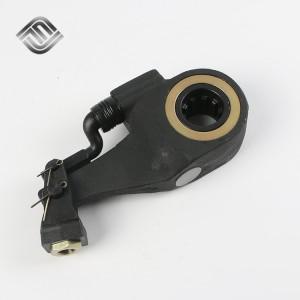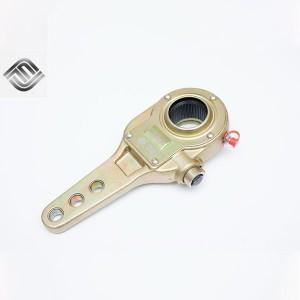Solenoid valves play a crucial role in enhancing truck efficiency. They optimize fluid control and reduce operational costs. By integrating these valves into modern truck systems, you can achieve improved safety and performance metrics. Understanding how solenoid valves function and their benefits is vital for you as a truck operator in 2025.
Key Takeaways
- Solenoid valves enhance truck efficiency by optimizing fluid control, leading to improved fuel consumption and reduced operational costs.
- These valves improve safety by quickly activating critical systems like brakes, ensuring reliable performance in emergencies.
- Investing in solenoid valves reduces maintenance needs, as they are durable and require less frequent replacements, saving time and money.
Functionality of Solenoid Valves

Mechanism of Action
A solenoid valve operates using electromagnetic principles. When you apply electrical current to the coil of the valve, it generates a magnetic field. This magnetic field moves a plunger or armature within the valve. As the plunger moves, it opens or closes the valve, controlling the flow of fluids. This action allows you to manage various systems in your truck, such as fuel delivery, brake systems, and cooling systems.
The precise control provided by solenoid valves is crucial. You can adjust the flow rate and pressure of fluids, which enhances the overall efficiency of your truck. For instance, when you need to increase fuel flow during acceleration, the solenoid valve responds quickly, ensuring optimal performance. This responsiveness helps you maintain better control over your vehicle, especially in demanding driving conditions.
Types of Solenoid Valves Used in Trucks
Several types of solenoid valves are commonly used in trucks, each serving specific functions. Here are some of the most prevalent types:
- Direct-Acting Solenoid Valves: These valves operate directly from the electromagnetic force generated by the coil. They are ideal for low-pressure applications and provide quick response times.
- Pilot-Operated Solenoid Valves: These valves use a small pilot valve to control a larger flow of fluid. They are suitable for high-pressure applications and offer greater flow capacity.
- Two-Way Solenoid Valves: These valves have two ports and can either allow or block fluid flow. They are commonly used in on/off applications.
- Three-Way Solenoid Valves: These valves have three ports and can direct fluid to different pathways. They are useful in applications where you need to switch between two different systems.
Understanding these types of solenoid valves helps you choose the right one for your truck’s needs. Each type offers unique advantages that can enhance your vehicle’s performance and efficiency.
Benefits of Solenoid Valves for Truck Operations
Fuel Efficiency Improvements
You can significantly enhance fuel efficiency in your truck by using solenoid valves. These valves provide precise control over fuel flow, allowing your engine to operate at optimal levels. When you accelerate, the solenoid valve quickly adjusts the fuel supply, ensuring that your engine receives the right amount of fuel at the right time. This responsiveness reduces fuel wastage and maximizes combustion efficiency.
Moreover, solenoid valves help maintain consistent pressure in the fuel system. This consistency prevents fluctuations that can lead to inefficient fuel consumption. By optimizing fuel delivery, you can expect to see a noticeable decrease in your fuel expenses, making your operations more cost-effective.
Enhanced Safety Features
Safety is paramount in truck operations, and solenoid valves contribute significantly to this aspect. These valves play a critical role in controlling various systems, such as brakes and steering. For instance, in emergency situations, solenoid valves can quickly activate braking systems, allowing you to stop your truck more effectively.
Additionally, solenoid valves help prevent leaks in fluid systems. A leak can lead to dangerous situations, especially with hydraulic fluids. By ensuring tight seals and reliable operation, solenoid valves enhance the overall safety of your vehicle. You can drive with confidence, knowing that these components are working to keep you safe on the road.
Reduced Maintenance Needs
Using solenoid valves can lead to reduced maintenance needs for your truck. These valves are designed for durability and reliability, which means they require less frequent replacements compared to traditional mechanical valves. Their robust construction allows them to withstand the harsh conditions of heavy-duty trucking.
Furthermore, solenoid valves simplify maintenance tasks. With fewer moving parts, there is less chance of mechanical failure. This reliability translates to lower downtime for your truck, allowing you to focus on your operations rather than repairs. By investing in solenoid valves, you can save time and money on maintenance, enhancing your overall efficiency.
Technological Innovations in Solenoid Valves for 2025

Smart Solenoid Valves
In 2025, smart solenoid valves will revolutionize how you manage fluid control in your truck. These valves come equipped with sensors and advanced algorithms. They monitor fluid flow and pressure in real-time. This technology allows you to make informed decisions about your truck’s performance. For example, if a valve detects a drop in pressure, it can alert you immediately. This feature helps you address issues before they escalate, ensuring your truck operates smoothly.
Smart solenoid valves also enhance energy efficiency. They adjust fluid flow based on your driving conditions. This adaptability reduces energy consumption and lowers operational costs. You can expect improved performance and reliability from your truck with these innovative components.
Integration with IoT and Fleet Management Systems
The integration of solenoid valves with IoT and fleet management systems marks a significant advancement in truck technology. By connecting your solenoid valves to the Internet of Things (IoT), you gain access to valuable data. This data helps you track the performance of each valve in real-time. You can analyze trends and identify areas for improvement.
Fleet management systems benefit from this integration as well. They allow you to monitor multiple trucks simultaneously. You can receive alerts about potential issues, schedule maintenance, and optimize routes. This proactive approach enhances your fleet’s efficiency and reduces downtime. With smart solenoid valves and IoT integration, you can take your trucking operations to the next level.
Solenoid valves are vital for your truck’s efficiency. They significantly improve fuel consumption, enhance safety, and reduce maintenance needs. As technology advances, these valves will evolve further. You should recognize their importance to make informed decisions for your trucking operations.
Post time: Sep-22-2025





